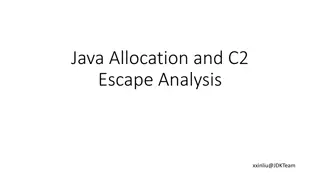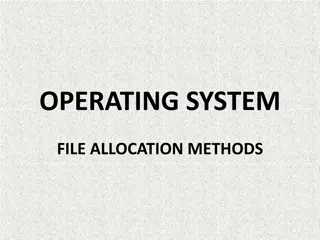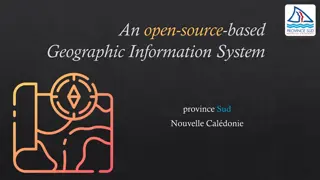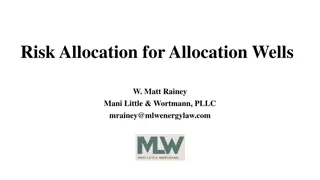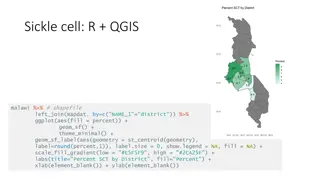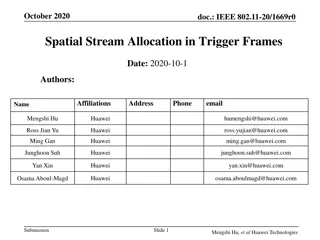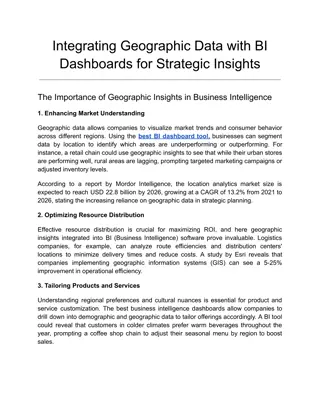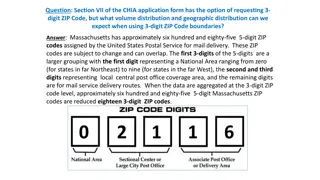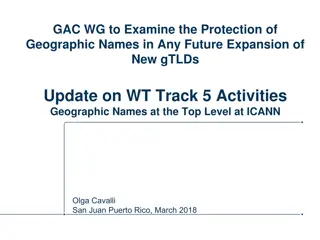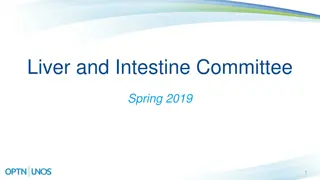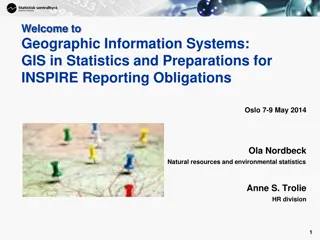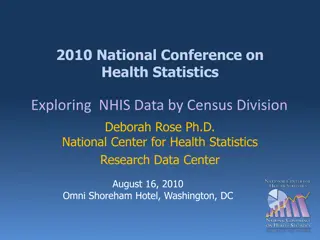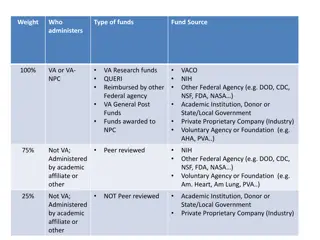Java Allocation and C2
Java object allocation and escape analysis play crucial roles in memory management and performance optimization within the Java Virtual Machine (JVM). This comprehensive overview covers topics such as object vs. scalar allocation, object allocation mechanisms, hotspot escape analysis, ideal and conn
2 views • 22 slides
Understanding File Allocation Strategies in Operating Systems
Explore various file allocation schemes like extent-based systems, linked allocation, file allocation table (FAT), indexed allocation, and combined schemes used in operating systems. Learn about their pros and cons, including details on maximum file size calculations based on disk block sizes and po
0 views • 20 slides
Operating System: File Allocation Methods
File allocation methods in operating systems determine how files are stored in disk blocks. The main methods include Contiguous Allocation, Linked Allocation, and Indexed Allocation. Contiguous Allocation involves allocating blocks in a contiguous manner for efficient disk space utilization and fast
0 views • 14 slides
Proposed Changes to Forward Capacity Cost Allocation
The document discusses proposed changes to the allocation of forward capacity costs effective June 1, 2020. It highlights the need for transparency in cost allocation, focusing on zonal demand curves and the Marginal-Reliability Impact. The current opaque method is critiqued for potential non-intuit
0 views • 47 slides
Evolution of Data Processing Systems in Geographic Information Science
Data processing systems in Geographic Information Science have evolved from manual, analogue methods to advanced software and hardware components. The incorporation of Geographic Information Systems (GIS) has revolutionized the handling and analysis of geo-referenced data, making tasks like data cap
0 views • 20 slides
Understanding Geographic Objects in GIS
Geographic objects play a crucial role in GIS by being easily distinguished and named based on parameters like location, shape, size, and orientation. These objects are studied collectively to understand their interactions and relationships, aiding in tasks such as navigation systems and route optim
4 views • 13 slides
Geographic Information System in Sud Nouvelle Calédonie
The province of Sud Nouvelle Calédonie utilizes an open-source-based Geographic Information System (GIS) to serve its territorial administration, with a focus on applications such as land administration, environment, agriculture, and urban planning. The system is supported by a team of engineers, g
0 views • 15 slides
Designing 9-Bit RU Allocation Subfield for EHT Trigger Frame in IEEE 802.11-20
IEEE 802.11-20/1845r2 presents a proposal for enhancing the RU allocation subfield design in the EHT Trigger frame to accommodate bandwidth support up to 320MHz and multiple RU or MRU allocations for UL MU transmissions in the 11be standard. The modification addresses inconsistencies in MRU mapping
0 views • 34 slides
Exploring 2nd Grade National Geographic: Weather, Tools, and Natural Disasters
Dive into the fascinating world of weather phenomena with 2nd-grade National Geographic resources. From predicting weather using clouds to learning about thunderstorms, hurricanes, and tornadoes, this educational journey also covers weather tools and being prepared for natural disasters.
0 views • 15 slides
Risk Allocation for Allocation Wells in Energy Law
Definition of allocation wells in energy law, advantages and disadvantages, lessees' rights, allocation of production to mineral owners, and legal cases related to pooling agreements. The content discusses various aspects of risk allocation for unagreed horizontal wells and the importance of clear a
0 views • 16 slides
what is Geographic Tongue and how does it look
Geographical tongue is an non-contagious condition that provides an atypical, map-like structure to the tongue. A detailed note on this problem is given here. For More Info Visit: \/\/ \/what-is-geographic-tongue\/
0 views • 11 slides
what is Geographic Tongue and how does it look
Geographical tongue is an non-contagious condition that provides an atypical, map-like structure to the tongue. A detailed note on this problem is given here. For More Info Visit: \/\/ \/what-is-geographic-tongue\/
0 views • 11 slides
Geographic Data Visualization in R and QGIS for Malawi Health Analysis
Utilizing R and QGIS, this project focuses on visualizing sickle cell and HIV percentages by district in Malawi, mapping health facility locations, creating Voronoi polygons, and displaying malaria cumulative incidence data. Various geographic data visualization techniques are applied to provide ins
0 views • 8 slides
Spatial Stream Allocation in IEEE 802.11-20 Trigger Frames
The document discusses spatial stream allocation in IEEE 802.11-20 trigger frames, specifically focusing on the SS Allocation subfield. It explains how trigger frames allocate resources for TB PPDU transmissions and solicit User Info fields, detailing the RU Allocation and SS Allocation subfields. T
3 views • 15 slides
Integrating Geographic Data with BI Dashboards for Strategic Insights
Explore the transformative potential of integrating geographic data into BI dashboard tool for strategic insights in our latest blog. Dive deep into the process\u2014from defining precise objectives and meticulous data collection to expert dashboard
0 views • 13 slides
Understanding Geographic Distribution Using 3-Digit ZIP Codes
Massachusetts has approximately 685 5-digit ZIP codes assigned by the USPS, which can be aggregated into 18 3-digit ZIP codes for geographic analysis. The distribution of Emergency Department visit volumes varies across these 3-digit ZIP code boundaries, reflecting different regional characteristics
1 views • 4 slides
GAC Working Group on Geographic Names Protection in New gTLD Expansion
The GAC Working Group is focused on improving protections for geographic names in future gTLD expansions. They aim to develop practical options and rules to reduce uncertainties for governments, communities, and applicants using geographic or community names. The group seeks to engage local communit
2 views • 27 slides
Enhancing Heart-Lung Allocation Policy for Organ Transplantation
This project focuses on improving the allocation of heart-lung blocks for organ transplantation by providing clear guidelines to Organ Procurement Organizations (OPOs). The goal is to ensure consistent practices among OPOs across the country, promoting fairness and efficiency in organ allocation. Th
0 views • 11 slides
Exposing the Myth of Misinformation Through Geography and GIS
Geography and Geographic Information Systems play a crucial role in debunking the myths of misinformation. Dr. Barry Wellar discusses the impact of misinformation, highlighting the importance of geographic data in transforming information and knowledge. The presentation delves into the reasons behin
0 views • 17 slides
Understanding the New Adult Heart Allocation System
The new adult heart allocation system introduces changes to match patients with hearts based on urgency and compatibility factors. The system aims to reduce waiting list deaths by transplanting the most urgent patients first. Changes include more specific criteria, broader geographic distribution, a
0 views • 17 slides
Understanding Tongue Disorders: Ankyloglossia, Black Hairy Tongue, Geographic Tongue
Ankyloglossia, also known as tongue-tied, is a congenital anomaly affecting tongue mobility. Black hairy tongue is the lengthening of papillae on the tongue surface, often temporary and resolve without treatment. Geographic tongue presents as white patches and is usually asymptomatic. Treatment opti
0 views • 10 slides
Understanding Dynamic Memory Allocation in Programming
Dynamic memory allocation is a crucial concept in programming where programmers use allocators like malloc to acquire memory at runtime for data structures. This process involves managing the heap, maintaining variable-sized blocks, and utilizing functions like malloc, free, calloc, realloc, and sbr
0 views • 33 slides
Update in Liver and Intestine Allocation Policies for Spring 2019
The recent updates in liver and intestine allocation policies for Spring 2019 include eliminating region and DSA from the allocation model, prioritizing medical urgency and proximity, enhancing pediatric candidate considerations, and adjusting weights for DCD and elderly donors. Acuity Circles Alloc
0 views • 15 slides
Changes in Capacity Allocation Regulations for Gas Infrastructures in Portugal
The new regulation in Portugal brings significant changes in capacity booking and trading to promote convergence with CAM NC and enable a secondary market. Major changes include ex-ante payment of capacity rights, capacity allocation via a booking platform, and enhancement of liquidity in the second
0 views • 13 slides
Geographic Information Systems: GIS in Statistics and INSPIRE Reporting Obligations
This document outlines the agenda and practical details for a GIS workshop focusing on statistical production and data processing related to geographic information systems. It includes sessions on population gridded data production, automation processes, and practical exercises. Participants from va
1 views • 5 slides
Understanding Memory Layout and Allocation in Computer Systems at Carnegie Mellon University
Exploring the memory layout and allocation in computer systems through lectures at Carnegie Mellon University, focusing on topics such as buffer overflow vulnerability protection, unions, shared libraries, stack, heap, data locations, addresses, and practical memory allocation examples. The content
1 views • 55 slides
Geographic Data Analysis in Health Statistics Conference
The 2010 National Conference on Health Statistics explored the use of restricted data at the National Center for Health Statistics Research Data Center. The presentation delved into the types of data requested, including small geographic areas, sensitive information, mortality files, and genetic dat
0 views • 45 slides
Effective Allocation Strategies for Decision-Making
Explore various allocation strategies such as Majority Rule, Random Selection, Authority, and Competition through a scenario of deciding who gets the candy. Analyze the efficiency and fairness of each strategy, consider the balance between economic efficiency and equity, and envision potential impac
0 views • 8 slides
Overview of the U.S. Federal Statistical System and Census Geography
The U.S. Federal Statistical System comprises 13 principal statistical agencies responsible for collecting and analyzing data across various sectors. The system includes agencies like the Bureau of Economic Analysis, Bureau of Labor Statistics, and U.S. Census Bureau. Geographic identifiers (GEOIDs
0 views • 94 slides
Optimization of Heart-Lung Allocation Policy for Organ Procurement Organizations (OPOs)
This document provides guidance to Organ Procurement Organizations (OPOs) regarding the allocation of heart-lung blocks, focusing on resolving issues related to Policy 6.5.E. The aim is to establish clear policies and principles to ensure consistent allocation practices among OPOs nationwide. Throug
0 views • 11 slides
Geographic Concepts Explained with Visuals
Explore various geographic concepts such as time zones, latitude, albedo, environmental spheres, and interactions between spheres through informative images and descriptions. Topics include longitude measurements, Tropic of Cancer location, hemispheres identification, time zone differences, environm
0 views • 34 slides
The System for Transparent Allocation of Resources (STAR) Overview
STAR is a framework implemented by GEF to allocate resources among biodiversity, climate change, and land degradation focal areas. It updates the Resource Allocation Framework to maximize impact, promote environmental policies, and meet country priorities through a structured allocation process. The
0 views • 26 slides
E-GRANT: Resource Allocation Tool Features and Development
E-GRANT is an advanced resource allocation tool developed by EGI-Engage for efficiently managing resources allocation for projects related to computing, storage, and VMs. The tool allows customers to send requests, negotiate resources, sign SLAs, and view allocations. It also enables resources provi
0 views • 5 slides
Meeting the Challenge of Diabetes in China: Prevalence, Trends, and Geographic Variances
This comprehensive study examines the prevalence, trends, and geographic variances of diabetes in China compared to the United States. With a focus on diabetes and prediabetes rates, the analysis spans over two decades, highlighting the significant burden of the disease in the Chinese population. Th
0 views • 24 slides
Challenges of Flow Rate Fairness in Network Resource Allocation
Addressing the concept of flow rate fairness in network resource allocation, this content explores its limitations and challenges. Despite being a goal in protocols like TCP, the practicality and enforceability of flow rate fairness are questioned. It highlights the inadequacy of flow rate as a meas
0 views • 15 slides
Understanding Geographic Coordinates: Importance and Significance
Explore the significance of geographic coordinates in oceanography and ecosystems. Learn why wind plays a crucial role in various oceanographic disciplines. Discover how latitude and longitude are utilized to pinpoint locations on Earth's surface, whether using degrees, minutes, seconds or decimal d
0 views • 31 slides
Soft Resource Allocation in N-Tier Application Scalability
This research paper explores the impact of soft resource allocation on n-tier application scalability, discussing topics such as over-allocation, under-allocation, bottleneck issues, and proposing a practical algorithm for effective resource allocation. It also covers the performance implications in
0 views • 36 slides
Understanding VERA Research Funding Allocation Process
The VERA (Veterans Equitable Resource Allocation) system determines the distribution of research funds within the VA. VAMCs report their expenditures, which are weighted and summed to calculate a national price. This price is used to allocate funds to individual sites. VERA dollars are distributed t
0 views • 7 slides
Exploring Geographic Features: From Oceans to Volcanoes
Discover the diverse range of geographic features, from vast oceans and intricate coral reefs to winding rivers and dense forests. Learn about intriguing formations like peninsulas, isthmuses, and straits, and delve into natural wonders like sinkholes and wetlands. From coastal regions to volcanic l
0 views • 29 slides
Effective Asset Allocation Strategies for Investment Success
Investment professionals emphasize the critical importance of the asset allocation decision in shaping investor outcomes. Strategic Asset Allocation (SAA) focuses on long-term goals, while Tactical Asset Allocation (TAA) addresses short-term objectives. Proper navigation through economic cycles invo
0 views • 18 slides
